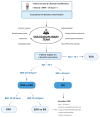Personalized Approach for Obese Patients Undergoing Endoscopic Sleeve Gastroplasty
- PMID: 34945770
- PMCID: PMC8704248
- DOI: 10.3390/jpm11121298
Personalized Approach for Obese Patients Undergoing Endoscopic Sleeve Gastroplasty
Abstract
Obesity is a chronic, relapsing disease representing a major global health problem in the 21st century. Several etiologic factors are involved in its pathogenesis, including a Western hypercaloric diet, sedentariness, metabolic imbalances, genetics, and gut microbiota modification. Lifestyle modifications and drugs often fail to obtain an adequate and sustained weight loss. To date, bariatric surgery (BS) is the most effective treatment, but only about 1% of eligible patients undergo BS, partly because of its negligible morbidity and mortality. Endoscopic sleeve gastroplasty (ESG) is a minimally invasive, endoscopic, bariatric procedure, which proved to be safe and effective. In this review, we aim to examine evidence supporting the role of a personalized and multidisciplinary approach, guided by a multidisciplinary team (MDT), for obese patients undergoing ESG, from patient selection to long-term follow-up. The cooperation of different health professionals, including an endocrinologist and/or obesity medicine physician, a bariatric surgeon, an endoscopist experienced in bariatrics, a registered dietitian, an exercise specialist, a behaviour coach, a psychologist, and a nurse or physician extender, aims to induce radical and sustained lifestyle changes. We also discussed the relationship between gut microbiota and outcomes after bariatric procedures, speculating that the characterization of gut microbiota before and after ESG may help develop new tools, including probiotics, to optimize weight loss outcomes.
Keywords: bariatric endoscopy; endoscopic sleeve gastroplasty; multidisciplinary team; obesity; personalized treatment.
Conflict of interest statement
G.C.: Consultant for and food and beverage compensation from Cook Medical, Boston Scientific, and Olympus. I.B.: Consultant for Apollo Endosurgery, Cook Medical, and Boston Scientific; board member for Endo Tools; research grant recipient from Apollo Endosurgery; food and beverage compensation from Apollo Endosurgery, Cook Medical, Boston Scientific, and Endo Tools. All the other authors have nothing to declare.
Figures
References
-
- World Health Organization Obesity and Overweight Factsheet. 2018. [(accessed on 10 December 2018)]. Available online: http://www.who.int/news-room/fact-sheets/detail/obesity-and-overweight.
Publication types
LinkOut - more resources
Full Text Sources


